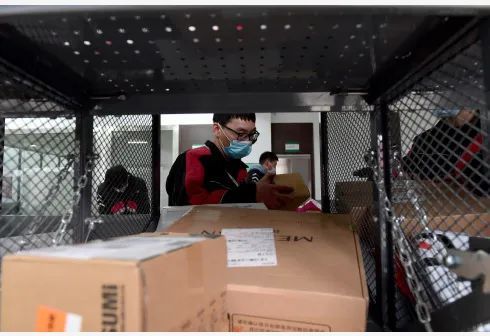Courier companies are breaking free from the dilemma of low-price competition. On January 20, SF released the express delivery business data for December 2021. According to the data, the revenue of SF Express products in December last year was 15.414 billion yuan, an increase of 8.77% year-on-year. In December, the business completion volume was 938 million votes, an increase of 8.31% year-on-year, and the revenue per ticket was 16.43 yuan, an increase of 0.43% year-on-year.
In addition, SF's supply chain and international business revenue in December was 9.109 billion yuan, an increase of 534.77% year-on-year. SF said the faster growth was mainly due to the revenue from the business related to the merger of Kerry Logistics. SF completed its acquisition of a 51.5% stake in Kerry Logistics on 28 September last year, and since October, the company's monthly business operations briefing has consolidated the relevant business revenue of Kerry Logistics.
On January 19, three express delivery companies, Yuantong, Shentong and Yunda, also released December operating data. Judging from the comparison of the operating data of express delivery companies in November and December, after the double 11 peak season, the revenue of Yunda, Shentong and SF Express fell slightly, and there was no significant decline.
According to the December express delivery operation data released by SF, Yuantong, Shentong and Yunda, the revenue of Yunda Express products in December was 4.316 billion yuan, an increase of 24.74% year-on-year and a decrease of 3.5% month-on-month. Shentong Express product revenue was 2.816 billion yuan, an increase of 25.88% year-on-year and a decrease of 3.8% month-on-month. SF Express's product revenue was 15.414 billion yuan, an increase of 8.77% year-on-year and a decrease of 5.1% month-on-month. Revenue from YTO Express products fell the most, reaching 3.934 billion yuan in December, up 19.95% year-on-year and down 12.8% month-on-month.
On the other hand, courier companies have continued to suffer from low-price competition over the past year, a dilemma that has eased since November 2021.
Taking Yunda Express as an example, its single ticket revenue from January to October 2021 was 2.23 yuan, 2.16 yuan, 2.19 yuan, 2.04 yuan, 2.02 yuan, 2.02 yuan, 2.04 yuan, 2.05 yuan, 2.14 and 2.17 yuan, respectively, which continued to decline year-on-year. In November, the revenue per ticket was 2.38 yuan, the highest point of single ticket revenue in 2021, and it also rose year-on-year. In December, Yunda Express's single ticket revenue was 2.35 yuan, up 2.17% year-on-year and down 1.2% month-on-month.

Not only Yunda, Yuantong also said that the low-price competition situation in the industry has continued to improve after the regulatory authorities have issued a series of regulatory policies and guidance.
On January 11, YTO Express announced its 2021 performance forecast. YTO expects to achieve a net profit attributable to shareholders of listed companies of 2 billion yuan to 2.2 billion yuan in 2021, an increase of 13.20% to 24.52% year-on-year.
This increase was primarily driven by the fourth quarter of growth. YTO expects to achieve a net profit attributable to shareholders of listed companies of 1.046 billion yuan to 1.246 billion yuan in the fourth quarter of 2021, an increase of 174.68% to 227.20% year-on-year.
As for the reasons for the performance growth, YTO said it was driven by three factors. First, industry prices continue to return to reasonable levels. Yuantong said that during the reporting period, the state and some local governments have successively issued a series of regulatory policies and guidance opinions on the express delivery industry to regulate irrational competition behavior and promote the sustained and healthy development of the express delivery industry. At the same time, with the arrival of peak seasons such as "Double Eleven" in the fourth quarter, the unit price of services in the express delivery industry has increased, the price competition has slowed down significantly, and it has gradually changed from price-driven to value-driven, and the industry price has continued to return to a reasonable level. Second, the quality of service continued to improve, and the pricing power of products was significantly enhanced. Third, strengthen customer service capacity building, customer structure adjustment has begun to achieve results.
Yang Daqing, an expert in the logistics industry, told the first financial reporter that in the future, express delivery companies can only enter the high-value-added market through continuous integration and upgrading, improve services; or reduce operating costs through lean management and digital transformation.